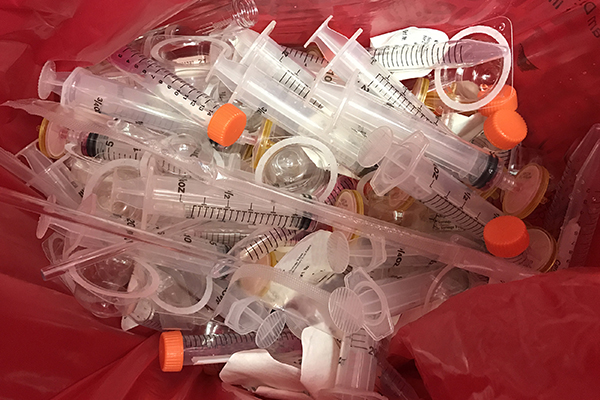7 Ways to Keep Your Digestive System Healthy

Your digestive system is a marvel, complex machinery that breaks down the food you eat, absorbs nutrients, and expels waste. A smoothly functioning digestive system ensures that you extract the maximum benefit from your diet and maintain overall health. It’s also a key player in immunity and mental well-being. To keep it running like a well-oiled machine, some habits and dietary choices can make a significant difference. Let’s discuss how you can promote a healthier digestive system.
Table of Contents
1. Incorporate Fiber-Rich Foods and Supplements
At the top of the list for a healthy digestive system is fiber. Fiber, found in plant foods, plays a pivotal role in promoting gut health. Not only does it add bulk to your stool, aiding in its passage through the intestines, but certain types of fiber also feed the beneficial bacteria in your gut. A diet rich in high-fiber foods such as whole grains, fruits, and vegetables can prevent constipation, reduce the risk of developing chronic diseases like colon cancer, and help maintain a healthy weight.
However, the hustle and bustle of modern life may mean we don’t always consume as much fiber as we should. That’s where supplements come into play TruFiber. One such beneficial supplement is TruFiber. For those who find it challenging to get their recommended daily intake of fiber through food alone, incorporating Fiber Plus can bridge the gap, ensuring the digestive system remains robust and efficient. But remember, while supplements can be beneficial, they should complement a healthy diet, not replace it.
2. Stay Hydrated
Water is the unsung hero of the digestive system. It dissolves fats and soluble fiber, allowing them to pass more easily through the system. A well-hydrated body ensures smoother bowel functions and helps prevent constipation. Furthermore, our digestive system relies on various enzymes and digestive juices, which have a more pronounced effect when the body is adequately hydrated.
It’s not just about drinking when you’re thirsty. It’s about making hydration a regular habit. Incorporate drinks like herbal teas or infuse water with slices of fruit for flavor. Remember, though, while beverages like coffee and alcohol can contribute to your fluid intake, they can also dehydrate, so balance is the key.
3. Limit Fatty and Fried Foods
While fats are an essential part of our diet, providing energy and aiding in the absorption of certain vitamins, excessive fats can be troublesome for the digestive system. They slow down the digestive process, meaning food stays in the stomach longer. It can lead to heartburn or make you feel ‘heavy’ after a meal.
Additionally, fried and greasy foods can be harder for the body to break down, leading to stomach discomfort or digestive disorders. Instead of deep-frying, consider grilling, steaming, or sautéing foods. When you do use fats, opt for healthier versions like olive oil or avocados. By being mindful of the kind and amount of fats in your diet, you can ensure your digestive system operates without a hitch.
4. Probiotics: The Gut-Friendly Bacteria
Probiotics have made waves in recent health discussions and for a good reason. They are live beneficial bacteria that inhabit the digestive system and assist in breaking down food, absorbing nutrients, and fighting off harmful bacteria. Foods rich in probiotics, like yogurt, kefir, and fermented foods, like sauerkraut and kimchi, can be a boon for your digestive health. If these foods aren’t to your taste or you’re looking to boost your probiotic intake, over-the-counter probiotic supplements are also available. By regularly including probiotics in your diet, you’re giving your gut the allies it needs to function optimally.
Additionally, a balanced intake of probiotics helps maintain an equilibrium between the beneficial and harmful bacteria in your gut, ensuring a harmonious digestive environment. This balance is essential not only for nutrient absorption but also for bolstering the immune system, as a significant portion of our immunity originates in the gut.
5. Chew Your Food Well
It might sound overly simple, but the act of chewing is a cornerstone of digestion. The process of mastication breaks down larger food particles into smaller bits, easing the job for your stomach and intestines. Moreover, saliva produced during chewing contains enzymes that begin the digestion process right in the mouth. So, by thoroughly chewing, you’re giving your digestive system a head start. The next time you sit down for a meal, slow down, savor each bite, and chew thoroughly. It’s not only better for digestion but also allows you to enjoy your food more.
6. Manage Stress
Our mental well-being has a surprising influence on our digestive health. Chronic stress, be it from work, personal life, or other factors, can disrupt the normal functioning of the digestive system. This disruption can lead to issues such as indigestion, constipation, or diarrhea. Developing stress-reducing habits such as deep breathing, meditation, regular exercise, or even just taking short breaks during a busy day can help in maintaining a calm mind and a happy gut. Remember, the mind and body are intrinsically linked. By taking care of one, you inadvertently take care of the other.
7. Limit Intake of Processed Foods
In today’s fast-paced world, processed foods offer quick, convenient meal options. However, they often come at a cost to our digestive health. Processed foods often lack the essential fibers and nutrients needed for healthy digestion. Furthermore, they might contain additives, preservatives, and excessive salts or sugars, which can disrupt the natural balance of our digestive system. Prioritizing whole, natural foods over processed ones nourishes the body and ensures smoother, more efficient digestion.
Conclusion
Our digestive system is a continuous channel that plays a pivotal role in overall health. It’s not just about breaking down food; it’s about nutrient absorption, immunity, and emotional well-being. By adopting these seven practices, we’re aiding digestion and ensuring this vital system remains robust and resilient. From the simple act of chewing to the foods we opt to include in our diet, each choice has a ripple effect on our digestive health. So, take a moment to reflect on your habits, make those slight tweaks, and your digestive system will surely thank you. Remember, a happy gut is a significant step towards a healthier life.



